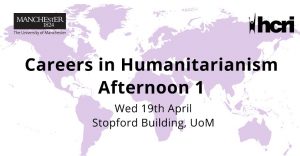Our latest events…
Navigating Crossroads: Advancements and Challenges in Medical Humanitarianism and Global Health, 11th September, UoM
This one-day conference explored the crossroads in the fields of medical humanitarianism and global health, highlighting the critical issues and emerging trends that shape the present and future of healthcare delivery in humanitarian and global settings. It also marked the start of our new five-year Wellcome Trust funded project on Historicising Humanitarian Medicine (here).
There is no multimedia from this event but please view the programme to get a flavour of it.
Ignoring Red Lines – Briefing on New Report on Violence Against Health Care in Conflict in 2022
HCRI hosted this webinar about the latest report from the Safeguarding Health in Conflict Coalition (SHCC), on violence against and obstruction of health care in 2022.
The full report is at: https://shcc.pub/2022RedLines
The almost 2,000 incidents of violence against health care in conflict was the highest recorded since the SHCC began tracking them, and 45% higher than in 2021. The webinar discussed the report’s findings and what must be done to address the disturbing trend.
Speakers included:
- Christina Wille, Director, Insecurity Insight
- Halla Keir, Advocacy and Research Officer, Medical Aid for Palestinians
- Lyubov Smachylo, Analyst, Media Initiative for Human Rights Ukraine
- Leonard Rubinstein, Chair, Safeguarding Health in Conflict Coalition
Shadowlands: Life After Conflict in Lyari, Karachi – Doc screening + Producer Q&A), 14th June 2023
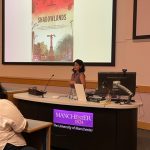 Shadowlands follows the stories of two residents of the area of Lyari in Karachi, Nawaz Laasi and Amna Baloch. Through telling their stories, this documentary sheds light on the on-going ramifications of violence and questions whether peace has truly been achieved for the people of Lyari.
Shadowlands follows the stories of two residents of the area of Lyari in Karachi, Nawaz Laasi and Amna Baloch. Through telling their stories, this documentary sheds light on the on-going ramifications of violence and questions whether peace has truly been achieved for the people of Lyari.
The event began with an introduction from the producer Nida Kirmani, Associate Professor of Sociology at the Lahore University of Management Sciences (LUMS).
Learn more about the film production on the EdJAM project page – Memories of Conflict: Healing from Lyari’s Violent Past – here
Book launch: Under the Weather – Reimagining mobility in the climate crisis (Dr S Sodero), 23rd May 2023
This event was co-hosted by HCRI, Tyndall Manchester and UoM’s Sustainable Futures initiative.
Our guest speaker is Dr Stephanie Sodero, Lecturer in Climate Change and Health at HCRI (here) and author of Under the Weather (here). The discussant is Dr Ruth Wood, Senior Lecturer in Environment and Climate Change and also a Research Fellow with the Tyndall Centre for Climate Change Research.
Dr Sodero’s talk is below (and the video she mentions at 27:30 is here).
Dr Wood’s talk is online here. Q&A is here
Film Night: Sugar Cage (2019) and Women’s Country (2019), 2nd May 2023
This was a student-led screening of two unique documentaries about displacement, migration and the meaning of home.
Details about the event are here
The screening was a fundraiser for two grassroots Syrian charities responding to the Türkiye-Syria earthquakes, raising £114.
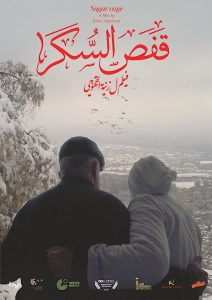
HCR Careers in Humanitarianism – Afternoon 2
26th April – Programme here
HCRI Careers Booklet here

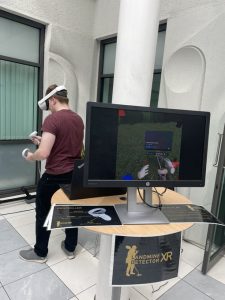

HCR Careers in Humanitarianism – Afternoon 1
19th April 2023, Programme here
HCRI Careers Booklet here
NB. If video doesn’t load, please use an alternative browser
Hostile (2022) and Director Q&A,13th March 2023
At this event, we screened the documentary Hostile, a BAFTA-longlisted feature-length documentary, focusing on the UK’s complicated relationship with its migrant communities. Told through the stories of four participants from Black and Asian backgrounds, the film focuses on the impact of the evolving ‘hostile environment’ policies that target migrants.
Following this, attendees participated in a Q&A with the film’s writer and Director Sonita Gale about filmmaking and the issue’s raised in her work.
This event was co-organised by HCRI staff and students, with special credit to HCRI undergraduate Maisy Vincent who introduced and chaired the session with finesse.
A trailer for documentary can be found here and background can be found on the website here
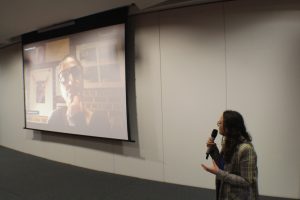
HCRI student Maisy Vincent and Director Sonita Gale
Nuclear weapons and humanitarian risks, 7th March 2023
Dr Alexis-Martin discussed her award-winning book Disarming Doomsday: The Human Impacts of Nuclear Weapons Since Hiroshima, which critically assesses the global social, cultural, and spatial inequalities and harms perpetuated by nuclear warfare, covering the victims of nuclear tests, the hibakusha in Japan, and international movements for disarmament. Becky’s slide on ‘Further Reading’ is here
Dr Boulton introduced the technical/medical aspects of nuclear weapons, the risks of nuclear use in the present (with a focus on Ukraine), and recommendations for harm prevention.
Responding to the earthquakes in Türkiye and Syria: Needs and challenges on the ground, 3rd March 2023
Speakers included: Zümrüt Sönmez, Executive Producer at TRT World (Türkiye); Nicolas Metri, Head of Programme (Türkiye) at the Danish Refugee Council; Ismail Alabdullah, Volunteer and Media Coordinator for The White Helmets (Syria); Nihad Sarmini, UoM student and humanitarian / development practitioner returning from volunteering in Türkiye with Action for Humanity; Raya Homsi, The Syria Campaign
Donations were encouraged to: The White Helmets (here), The Syria Campaign (here), Action for Humanity (here), DRC (here).
There was a lot of interest in local organisations involved in the response effort, so we have listed some here, here, and here
Grassroots responses to climate change: Voices from Pernambuco, Brazil, 7th Feb 2023
At this HCRI public event, we were joined by Maria Silvanete Lermen and Deybison Silva De Albuquerqe from the State of Pernambuco in Brazil. They are leaders of the two Afro-descendant grassroots associations: Chã da Terra (Maria) and Quilombo do Catucá (Deybison). Our guests talked about the community-led response to the floods that affected the State of Pernambuco in May 2022, which were the deadliest in 40 years in Brazil, as well as the everyday consequences of climate change in their territories. This was a unique opportunity to hear from people organising at the front line of climate change. A blog post about the flooding can be found at: https://www.grripp.net/post/solidarity-with-the-people-of-pernambuco
Maria’s slides / photos are available in PDF here
HCRI Panel: Attacked – Healthcare in the Ukraine and Syria conflicts, 8th Dec 2022
This public event saw updates from and comparisons between the humanitarian situations in Syria and Ukraine, with a focus on attacks on and the responses of healthcare systems and workers. Speakers included Dr Zahed Katurji (aka ‘Hamza Al-Kateab’), a Syrian doctor, human rights activist and public health advocate; Christina Wille is the Director of Insecurity Insight, founder of the Aid in Danger Project and the Security in Numbers Database; and Sophie Désoulières heads the humanitarian affairs, operational communications and advocacy department at MSF’s Operational Centre Amsterdam.
HCRI / MILC public Lecture: Guantanamo and the legal battle against torture, 22nd Nov 2022, Speaker: Lisa Hajjar, Professor and Chair of the Sociology Department, University of California – Santa Barbara
Prof. Hajjar discussed her new book, The War in Court: Inside the Long Fight against Torture, with a particular focus on the legal battles over the treatment of people detained at Guantanamo. Those who took up the fight against the government over torture, forced disappearance, protracted incommunicado detention, and invented law-of-war offences for use in the military commissions were lawyers. Prof Hajjar explained why hundreds of legal professionals – JAGs and attorneys from corporate law firms, human rights lawyers and solo practitioners, law professors and their students – were galvanised to defend the rule of law that was upended by the torture policy and enlisted in what turned into a war in court.
HCRI book talk: The Vulnerable Humanitarian – Ending burnout culture in the aid sector
8th Nov 2022 // Speaker: Dr Gemma Houldey, writer, researcher and facilitator of wellbeing in the aid sector (website)
Dr Houldey introduced her new book, The Vulnerable Humanitarian, which challenges the prevalence of stress and burnout culture within the aid sector, laying bare the issues of power, agency, security and wellbeing that continue to trouble organisations and staff. Proposing new ways of addressing wellbeing that are sensitive to the multi-faceted personalities and lived experiences of people working on aid and development programmes, The Vulnerable Humanitarian is essential reading both for current aid sector employees and for prospective employees and students.
HCRI Landmark Lecture: Gender and disasters – Presence and absence in policy and practice
11th October 2022 // Speaker: Maureen Fordham BSc PhD is Professor of Gender and Disaster Resilience and is the Centre Director of the IRDR Centre for Gender and Disaster at UCL (website).
There is now a considerable body of work that addresses a range of issues that connect gender and disaster (see resources at: https://www.gdnonline.org/resources). For some parts of the disaster-humanitarianism-development nexus, it is no longer necessary to explain why we need to include gender; for others there is still much work to be done. For example, disaster warning systems often prioritise technical over social parameters, but we will see a UN Women video whose main protagonist (a grassroots Unit Leader in the Cyclone Preparedness Program Bangladesh), clearly articulates the gendered social context of warnings.
The disaster-humanitarianism-development nexus itself encompasses many differing aims, worldviews, tasks and approaches – even without the addition of gender. Bringing all these together can mean that we all may be starting at very different levels of understanding, interest or willingness to engage with this issue.
This presentation offers some examples of the ways the gender and disaster connection has been addressed, sidelined or simplified and some thoughts about continuing gaps, challenges and opportunities. For example, we explored how Bangladesh has made a major gender responsive input to their National Resilience Programme, the goal of which is ‘To sustain the resilience of human and economic development in Bangladesh through inclusive, gender responsive disaster management and risk informed development’,
In policy areas (e.g the Sendai Framework for Disaster Risk Reduction 2015-2030), we have seen some enhancement of the gender focus since earlier Global Frameworks, but we still need to make the case for a vision that goes beyond a narrow focus on women and on women as vulnerable, and that addresses intersectionality.

